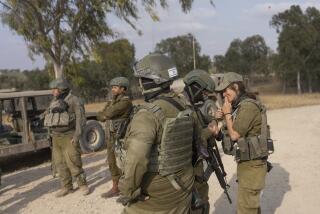Venezuela-Colombia summit to include issues of rebels, trade
- Share via
Reporting from Bogota, Colombia — In an effort to improve severely strained diplomatic relations, Venezuelan President Hugo Chavez and newly inaugurated Colombian President Juan Manuel Santos plan a summit Tuesday likely to include discussion of the alleged presence of Colombian rebels in Venezuela and frozen cross-border trade.
Chavez and Santos, who was sworn in Saturday, have expressed a desire to improve relations between their nations after tension between Chavez and former Colombian President Alvaro Uribe. Officials announced Monday that the meeting would take place in the city of Santa Marta in Colombia.
Chavez broke diplomatic relations and placed restrictions on the entry of most Colombian goods last month after the Uribe government presented videos and photographs that purported to show that Chavez was tolerating the presence of 1,500 members of the Revolutionary Armed Forces of Colombia on Venezuelan soil. Chavez angrily denied the accusation.
Chavez and Uribe had regularly exchanged barbs in recent years, but during his inauguration speech Saturday, Santos said restoring good relations with Venezuela and Ecuador was a top priority of his administration. Chavez recently has urged the FARC to release all hostages and lay down its weapons.
Both countries stand to gain economically from a rapprochement. If the border remains sealed to Colombian products, businessmen here could lose the bulk of $6 billion in annual sales to Venezuela, including cattle, coffee, dairy products, auto parts, construction materials and other goods.
Colombian economist Francisco Thoumi said in a recent interview that the trade restrictions could shave 1 percentage point off Colombia’s expected economic growth rate this year of about 4%.
For Chavez, an accord could allow him to reopen the doors to Colombian products, particularly foodstuffs he has had to replace with higher-priced imports from other nations at a time of rising consumer discontent and economic pressures.
Many Venezuelans are incensed over an ongoing scandal involving the government’s mismanagement of cargo containers carrying tens of thousands of tons of imported foodstuffs that were left to rot.
Patrick Esteruelas of the Eurasia Group risk analysis firm in New York warned against high expectations from the meeting and cautioned Monday that Colombian exporters are unlikely to regain the access they once had to the Venezuelan market. He noted that foreign currency exchange controls imposed by Chavez recently have made Colombian goods less competitive.
For Santos, a deal reestablishing relations and reopening the border to trade would make cattlemen and auto industry executives happy. Any agreement from Chavez to more closely guard the border to prevent rebels from crossing would allow the Colombian leader to focus on domestic issues.
A key issue immediately facing Chavez and Santos is whether a lasting framework for better relations will emerge, said Socorro Ramirez, a political science professor at the National University of Colombia in Bogota.
Such a framework could include the restarting of bilateral commissions that include members of the foreign and defense ministries from each country as well as special presidential staffers dedicated to dispute resolutions. Although those commissions exist, they are not currently functioning, she said.
“Direct dialogue is the best option but such accords should be accompanied and verified by the international community,” Ramirez said.
Kraul is a special correspondent.
More to Read
Sign up for Essential California
The most important California stories and recommendations in your inbox every morning.
You may occasionally receive promotional content from the Los Angeles Times.













